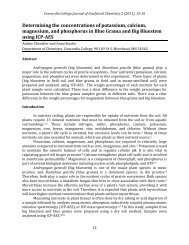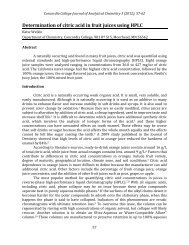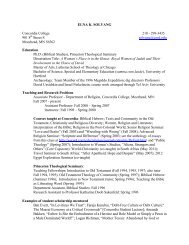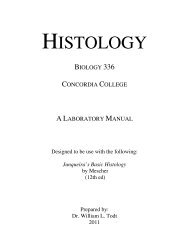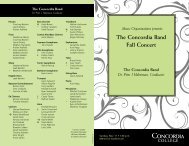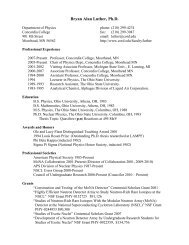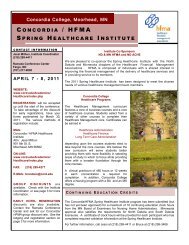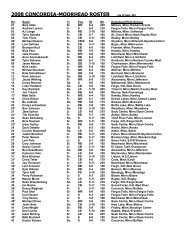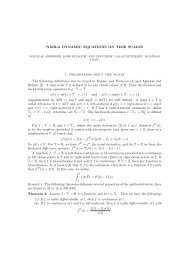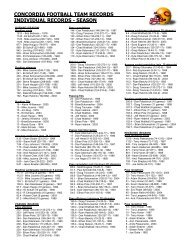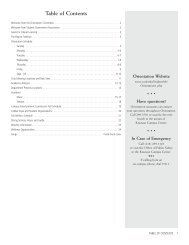Djembe - Concordia College
Djembe - Concordia College
Djembe - Concordia College
You also want an ePaper? Increase the reach of your titles
YUMPU automatically turns print PDFs into web optimized ePapers that Google loves.
Dr. Edward Schmoll<br />
Classical Studies Departent<br />
28<br />
Mentor<br />
This is the first of what I hope will be a series of<br />
brief, occasional essays on the classical and mythical origins<br />
of ordinary English words. The word “mentor,” usually<br />
defined as a guide, counselor, or giver of sage advice has its<br />
origin in Homer’s epic tale The Odyssey.<br />
The first five books of The Odyssey are called “The<br />
Telemachia,” or “All about Telemachus,” the young son of<br />
Odysseus. When we first encounter him, he is little more than<br />
a twenty-year old nursling who serves as consolation for his<br />
mother, Penelope, and is the subject of scorn and derision for the 108 suitors who relentlessly press<br />
their claim to marry this supposed relict. The problem with Telemachus is that he has no father<br />
present to instruct him in the ways of manhood. The storm-tossed Odysseus is currently adrift in a<br />
world of witches and monsters.<br />
While Telemachus finds himself without a parental model for emulation and deterrence,<br />
he is not without resource or support. In book II, he summons the Greeks to an assembly wherein<br />
he speaks his mind to the rapacious suitors and divulges his immediate plans to go in search of<br />
word of his father. At this point, Mentor, an old friend of Odysseus, who has been entrusted to keep<br />
all things at the estate safe and sound, rises to praise God-like Odysseus who ruled his people with<br />
a father’s loving care. He also sternly reproves the suitors for their outrageous behavior. At the<br />
very least, from Mentor’s words Telemachus gets an inkling of what sort of man he father was and<br />
learns in part what sort of honorable and upright behavior is expected of himself.<br />
Prior to his departure, Telemachus addresses the goddess Athene, who appears to the boy<br />
disguised as Mentor. Among other things, she says:<br />
Few sons indeed are like their fathers. Generally they are worse, but just<br />
a few are better. And since you are by no means lacking in Odysseus’<br />
resourcefulness, and since you will be no fool or coward in the future, you<br />
can hope to succeed in this undertaking. [Bk. II, 276-280]<br />
Further, Telemachus learns that a crew has been conscripted for his ship and the craft itself has<br />
been fully provisioned. Thus, with this sort of “mentoring,” Telemachus, newly encouraged and<br />
resolute, is prepared to undertake his first act of maturity: to go in search of news of his father. It<br />
simply took a mentor to speed him on his way.<br />
Despite its ancient pedigree, mentoring continues to be an invaluable, if informal, educational<br />
institution. Here at <strong>Concordia</strong>, students often avail themselves of the wisdom and experience of<br />
their faculty members, who guide them through the labyrinthine ways of undergraduate education.



